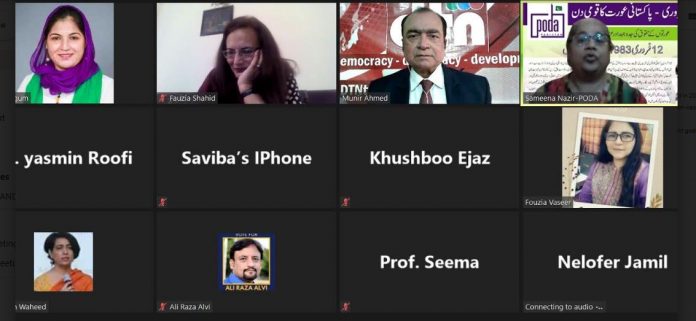ISLAMABAD, FEB 13 (DNA) – The panel of experts speaking at a webinar said that Pakistani women’s struggle for equal rights has continued over the decades despite all odds and dictatorship. The democratic governments have done ample legislation but the implementation lacks that deprive women of their lawful rights.
Gender inequality underpins many problems which disproportionately affect women and girls, such as domestic and sexual violence, lower pay, lack of access to education, and inadequate healthcare.
The speakers said women suffer from pervasive gender-based violence, from domestic abuse, honour killings, and sexual violence to institutional discrimination. There is a widespread lack of consistent access to quality family planning services in Pakistan, resulting in one of the highest unmet needs in Asia. Still women are denied the right to vote, inheritance, choice of spouse and economic engagement.
The national webinar was organized by the Development Communications Network (Devcom-Pakistan) on Saturday. The guest speakers included senior journalist Fauzia Shahid, president PODA Sameena Nazir, Head of Women Development department of Islamic University Bahawalpur Dr Yasmin Roofi, Kinnaird College Lahore Professor Dr Kushboo Ejaz, Shad Development Foundation Executive Director Shad Begum from Khyber Pakhtunkhwa, National Press Club senior vice president Sadia Kamal, Dr. Nilofer Jamil from Quetta, Devcom-Pakistan Executive Director Munir Ahmed and senior journalists CR Shamsi, Anwar Iqbal (Washington) and Ali Raza Alvi.
Senior journalist Fauzi Shahid said February 12 is commemorated to remember the brave struggle of the women for their rights launched in 1983 when the dictatorial regime promulgated legislation contrary to the women’s democratic and lawful rights. Unfortunately the patriarchal thinking has continued over the years despite continuous struggle. Now women have found some space but the destination of equal rights is still far sighted.
PODA president Sameena Nazir said legislation is done but did not communicate to the bottom where it is to be implemented. There is no adequate mechanism to educate the implementing agencies about the enforcement of law. The rural areas and marginalized communities still suffer in the absence of implementation and sanitization of the agencies.
Devcom-Pakistan Executive Director Munir Ahmed said some of the problem faced by women in Pakistan are domestic violence, honour killing, rape and abduction, marital rape, forced marriages, and induced abortions. The Global Gender Gap Index report of 2020 ranked Pakistan 151 out of the total 153 countries. This is ironic that women rights are compromised despite assurance in the religion of Islam and the constitution of Pakistan.
Shad Begum said the social and political environment in Khyber Pakhtunkhwa is not conducive for women. It is very difficult to challenge the social taboos to raise the voice for women rights though we have ray of hope as the local women of the urban towns find their ways to the mainstream platforms. The majority still struggles for the basic human rights.
Dr. Yasmin Roof said what the women demand is not the western agenda but are the rights ensured in the religion and the constitutions. We need to restore the shrinking space for civil society voices. Males of the families need to encourage women to play their active role in the family and society.
Dr Khushboo Ejaz mentioned that Higher Education Commission has encouraged to establish anti-sexual harassment committees in the universities after having noticed the rising complaints of sexual harassment. We have legislation but needs to have implementation in letter and spirit.=DNA
===============================











